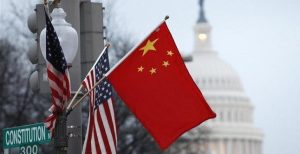The stock markets in the United States continued their plunge with Wall Street marking its eighth straight days in the red, falling over 1000 points within the first 30 minutes of trade Friday in New York before closing 355 points in the red.
Investors dumped equities amid a rapidly spreading coronavirus with at least 53 countries now reporting cases of COVID19 including the first case in sub-Saharan Africa that was confirmed in Nigeria. This, as the United Nations Secretary General warned that the window to avoid a pandemic was a closing fact.
Markets across the globe echoed the sentiment.
With more than 83 000 now infected, 2800 have died mainly in China but new infections outside the country are now outpacing those within.
WHO Director General Tedros Adhanom Ghebreyesus says: “Our message continues to be that this virus has pandemic potential, and WHO is providing the tools to help every country to prepare accordingly.”
The UN Secretary General Antonio Guterres also weighed in. “Now is the time for all governments to step up and do everything possible to contain the disease – and to do so without stigmatization, respecting human rights. We know containment is possible, but the window of opportunity is narrowing. And so I appeal for solidarity and full global support, with all countries assuming their responsibilities. As they do so, they can count on the support of the United Nations and the World Health Organization.”
But the efforts are being challenged by the spread – with cases now reported in Brazil, the first in South America.
Nigeria’s sprawling city of Lagos – the first in Sub Saharan Africa while growing numbers in Italy at over 600, South Korea at over 2300, Japan with more than 900 and Iran at over 200, is contributing to unease on world markets.
Chief Investment Officer of Global X Jon Maier says: “There’s a lot of fear out there. And, you know, potentially there’s some pressure politically. And if you look at the implied probability for one, two, or three rate cuts, it’s increased meaningfully over the past six days.”
All three US benchmark stock indices closed in what is called correction territory – falling more than 10% but less than 20% from highs, a level which would push corrections into a bear market amid widespread pessimism and negative investor sentiment.
Global Head of Currency Strategy and Market research Jameel Ahmad says: “What I’m concerned about now is this is the global natural disaster. It’s unforeseen. It’s something that can’t be controlled. It’s even difficult to contain this let alone trying to control this. So I see problems of business confidence, whether businesses can really meet that demands that obligations when it comes to paying staff.”
“You know, the other financing terms supply, and you know what’s happened to that productivity. And that, in turn, will impact the consumer because all of a sudden the consumer will get more concerned.
“All of a sudden, restaurants become quieter, retailers and so on. So this is where the knock-on effects has the problem, which could tip the global economy in that direction. But I don’t see it quite now. If we meet again in a couple of months and the situation is this, then yes, we will see that,” Ahmad explains.
Domestically, the United States has confirmed 60 cases including one patient in California that contracted the virus through unknown means, as the White House moved to appoint Vice President Mike Pence to lead a coronavirus task force.
President Donald Trump earlier this week, said: “We have done it a credible job. We’re going to continue. It’s going to disappear one day. It’s like a miracle. It will disappear from our shores. We’ve you know, it could get worse before it gets better. It could maybe go away. We’ll see what happens. Nobody really knows. The fact is, the greatest experts have spoken to them all. Nobody really knows. But we have done and our professionals have done a fantastic job.”
A sentiment global market continues to reject.
Sherwin Bryce-Pease detailing how the virus crippling US market






